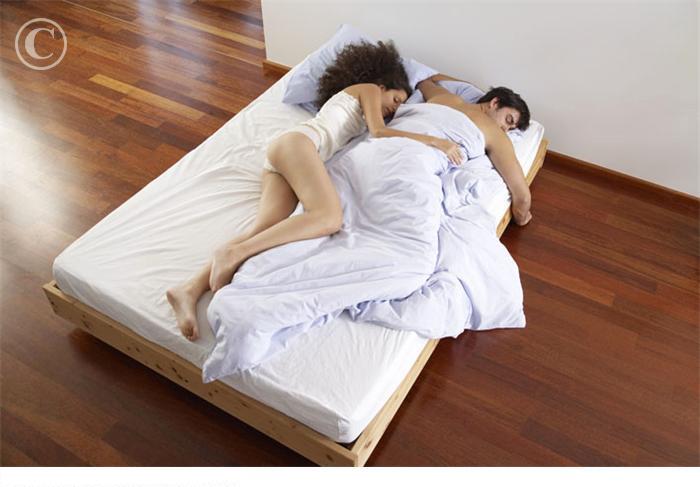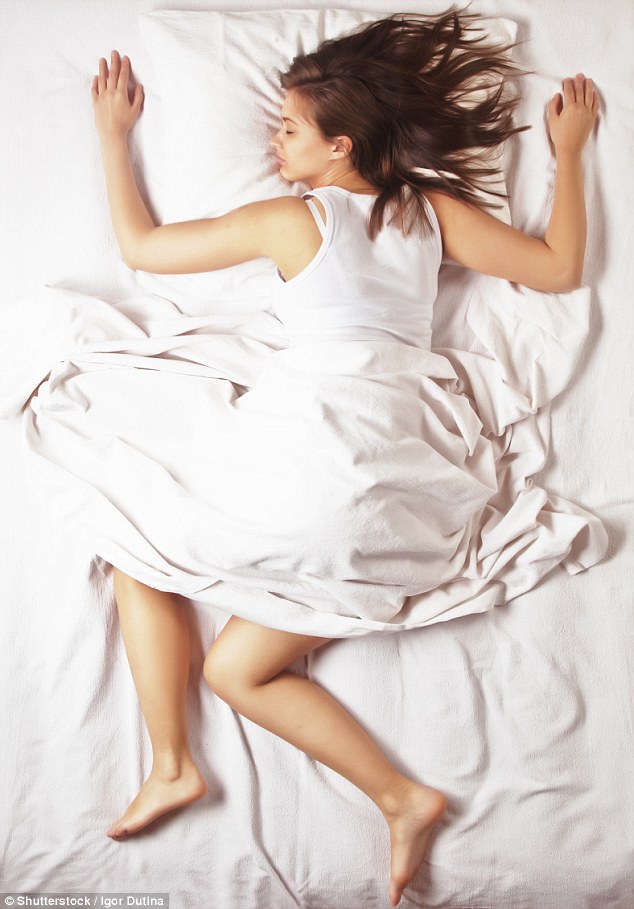Do you curl up at night in the foetal position or can you only get to sleep on your back? For most people, the way they lie in bed is deeply ingrained. But research suggests that our choice of sleeping position can seriously affect our health and wellbeing.
Sleeping on your left side can significantly increase the chance of having nightmares. But sleeping on the right will help to alleviate heartburn.
Your sleep position can also determine whether you’ll age prematurely and could even help to prevent Alzheimer’s. So here are the pros and cons of the five most common sleeping styles…
ON YOUR LEFT
PROS
People who suffer from regular bouts of heartburn – estimated to be around 20 per cent of the British population – report significant relief from their symptoms when they sleep on their left side.
‘Symptoms of heartburn are often worse at night,’ says Dr Matthew Noble, a GP for the online medical consultancy babylonhealth.com. ‘We’re not exactly sure how it works, but when people sleep on their left side, the internal organs seem to align in a way that helps to significantly reduce the amount of acid leaking out of the stomach into the oesophagus, which is what causes the pain associated with heartburn.’
CONS
In a study carried out by scientists at the Yuzuncu Yil University in Turkey, published in the international Journal of Sleep and Hypnosis, 40.9 per cent of people who chose to sleep on their left sides reported regular nightmares, compared to just 14.6 per cent of those who preferred to sleep on their right sides.
ON YOUR BACK
PROS
If you have back pain, sleeping on your back, with a supportive pillow under your head and knees that’s just thick enough to keep your spine aligned, can help alleviate it – or at least, give you a relatively comfortable night’s sleep, says osteopath Amy Hope of Hope Osteopathy in London.
And you get better beauty sleep on your back, as cosmetic surgeon Dr Goesel Anson explains: ‘Because your face isn’t being pressed firmly into a pillow for six hours or more at a time, you’re less likely to get wrinkles and spots.’
When you lie face down, your face can get sweaty, which blocks pores.
CONS
Several credible studies have found that sleeping on your back – the supine position – can double the incidence of snoring and sleep apnoea, compared with sleeping on your side.
Sleep apnoea is when a lack of muscle tone in airways causes you to snore loudly and stop breathing for ten seconds or more during sleep, causing serious health problems, from excessive daytime drowsiness to high blood pressure, diabetes and depression.
Lying on your back can make it worse because gravity makes the tongue fall to the back of the throat, narrowing airways.
Sleeping on your back is also thought to exacerbate teeth grinding. In one study, sufferers averaged 19 jaw clenches an hour sleeping on their backs, compared with 13 clenches per hour sleeping on their sides.
FETAL POSITION
PROS
Osteopath Amy Hope recommends curling into the foetal position for a good night’s sleep.
‘The foetal position gives the spine enough flexibility to move during the night if you need to change position and, as long as you don’t curl up too tightly, allows you to breathe easily, too.’
Research into the links between personality types and sleeping positions by sleep expert Professor Chris Idzikowski of the Sleep Assessment and Advisory Service revealed that foetal sleepers tend to be conscientious and ordered types who often unconsciously use the comfort of this childhood pose to help them deal with stresses and concerns overnight.
Little wonder many foetal sleepers report waking refreshed and ready to face the day.
CONS
If you suffer from neck pain, this position can put pressure on joints at the base of the skull and worsen it.
‘Though it’s comfortable for most people, you need a pillow under your head to ensure your neck and spine are aligned if you don’t want to wake with a stiff neck or sore shoulder,’ says osteopath Amy Hope.
‘Look for a relatively firm texture,’ she advises. ‘It needs to be big enough to fill the gap between ear and neck.
The head needs to be held straight, in line with your spine and shoulder. So a broad-shouldered man needs a thicker pillow than a slightly built woman.
If you suffer back problems, a slim pillow between the knees can help to keep your spine more comfortable.’
ON YOUR RIGHT
PROS
If you have high blood pressure, you may want to start sleeping on your right side.
It gives the heart, in the left of your chest, a little extra room in the chest cavity, which can help lower blood pressure and slow heart rate, both of which can benefit people with heart problems.
Sleeping on the left or right is also thought to improve waste clearance in the brain, spinal cord and nervous system, which could, one day, help to prevent Alzheimer’s and other neuro-degenerative diseases, say researchers from Stony Brook University in the U.S.
In their work on anaesthetised rodents, the glymphatic system, which runs alongside vessels in the brain and is most active in sleep, was found to be up to 25 per cent more efficient at removing amyloid beta and tau proteins – waste products linked to Alzheimer’s – when rodents were put on their sides rather than their backs or fronts.
Researchers believe sleeping on our side is likely to help the clearance of waste products in the human brain in a similar way.
CONS
If you are pregnant, experts say sleeping on your right side in late pregnancy carries a higher risk of stillbirth.
Researchers from the University of Auckland, New Zealand, studied sleep behaviours of 155 women who had stillborn babies and 310 who had live births.
They suggest restricted blood flow to the baby may be a reason for the findings.
ON YOUR FRONT
PROS
Sleep expert Chris Idzikowski says sleeping on your front in the ‘freefall’ position, with arms raised to the side, puts internal organs in the ideal position to encourage comfortable digestion after a heavy meal, while experts from Hong Kong’s Shue Yan University found people who sleep on their fronts tend to have more exciting dreams – including saucy ones about being tied up – than those who sleep in any other position.
It’s thought to be linked to the fact that it’s more difficult to breathe if lying face forward.
CONS
‘Sleeping on your front – lateral sleeping – is the worst possible position you can sleep in from a musculoskeletal point of view,’ says Rishi Loatey of the British Chiropractic Association.
‘In order to breathe comfortably, you have to lie with your head and neck almost fully rotated to one side for many hours.’ It can overstretch and tighten opposing neck muscles and pinch nerves, leading to headaches, a stiff neck, tight shoulders and in some cases, pain radiating down the arms.
Sleeping laterally may make lower back pain worse as it can accentuate the curve in the small of the back.













You must be logged in to post a comment.